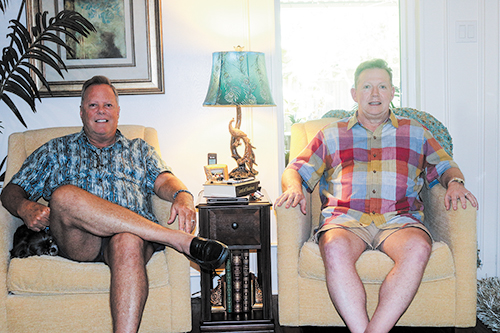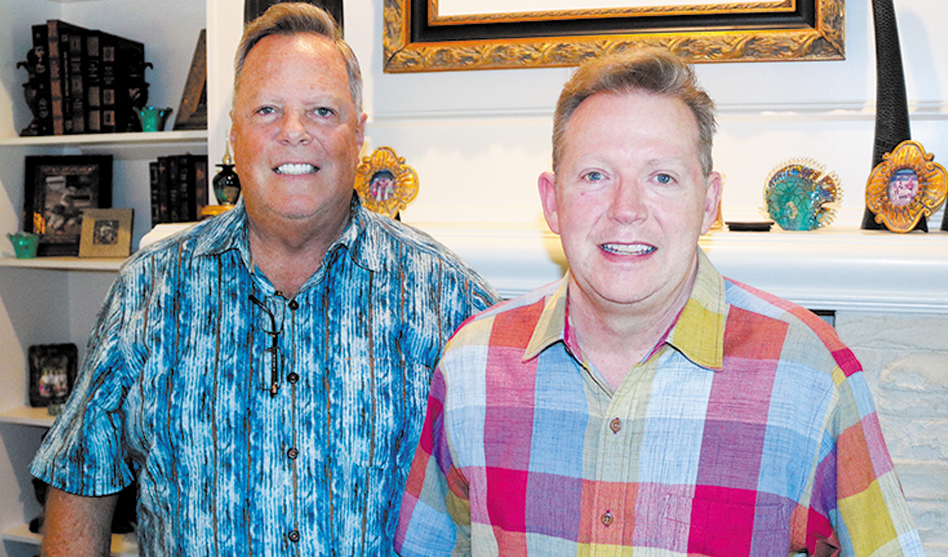Terry Wicks, left, and Michael Draper
After Michael Draper was diagnosed with a rare brain disease, his husband retired to take care of him full-time
DAVID TAFFET | Senior Staff Writer
taffet@dallasvoice.com
 Michael Draper describes the condition he’s been dealing with for seven years as a “designer disease.” His husband, Terry Wicks, said that when they finally received a diagnoses, “the bottom dropped out of our world.”
Michael Draper describes the condition he’s been dealing with for seven years as a “designer disease.” His husband, Terry Wicks, said that when they finally received a diagnoses, “the bottom dropped out of our world.”
Draper went almost two years before receiving a diagnosis of MSA — multiple system atrophy — a progressive neurodegenerative brain disorder that results in death.
Wicks has become his full-time caregiver.
MSA is often misdiagnosed as Parkinson’s Disease, but it seems to be more related to other diseases like PSP and Alzheimer’s characterized by a build up of certain proteins in the brain. Wicks explained that with MSA, the proteins needed to transmit signals from one cell to another seem to crumple and block transmission. As that happens, brain cells die.
Functions that are automatic — maintaining body temperature, swallowing, breathing, eliminating waste — stop working. Speech is affected. Muscle coordination deteriorates. The person with MSA becomes unable to take care of himself.
 In 2013, the couple was living in California. Draper was an executive with Yahoo. Wicks was an MRI technician.
In 2013, the couple was living in California. Draper was an executive with Yahoo. Wicks was an MRI technician.
Wicks remembers asking his husband one day, “Why are you so clumsy lately?”
After a year of a variety of symptoms presenting themselves and several doctors unable to diagnose what was wrong, they went to Stanford for a diagnosis. After almost a year of visits, their doctor told them that she was waiting for one more symptom to appear. When it did, she confirmed MSA.
Symptoms appear when a person is in his or her 50s. Draper was 52 when they first recognized something was wrong. Those manifestations progress for five to 10 years.
New drugs are being tried to halt progression, but Wicks said his husband’s condition was too advanced for the medications to work. And because it takes so long to diagnose, most people have progressed beyond the point where these medications will help.
Four years ago, both men had to stop working. Draper was unable to work any longer so Wicks, who’s seven years older, retired to take care of him.
They decided to move back to Dallas to be closer to family. Their doctor at Stanford told them Dallas was a perfect choice because a colleague of hers had recently opened an MSA clinic at UT Southwestern, so Draper would receive top medical care.
Wicks made a trip by himself and purchased a house in Garland. He said it was the only time in their 29 years together that he had bought a house without his husband.
Wicks describes himself as a planner. So before leaving, he had planned what they needed in a house. He found one in Garland that fit his needs — a 1980s one-story ranch without any stairs or steep inclines that could be outfitted for their needs.
Among the work needed on the house was a complete bathroom redo. They replaced the tub with a walk-in shower fitted with a large tiled seat and an entrance without a step so that a wheelchair can roll in.
Because someone with MSA eventually has trouble turning around, Wicks found something he calls a pivot disk, sort of a lazy susan for people. From his wheelchair, Draper can stand and Wicks rotates him 180 degrees so he can sit in the shower or on the toilet.
Wicks said a person who needs this level of care loses all personal dignity and they’ve worked to keep Draper as independent as possible as long as possible. When he couldn’t brush his own teeth with a regular brush, they got an electric toothbrush.
Draper joked that he could still use a razor as long as his husband didn’t mind seeing him with slash marks all over his face. An electric razor allows him to continue shaving himself for now.
While they still are able to make a trip to the hair salon to get his hair cut, their hairdresser said he’d come to house once he can’t get out any longer.
Until recently, Draper had been using mostly a walker. Lately, he’s less able to make it around the house that way, and he’s begun relying more on his wheelchair.
Over the last few weeks, Wicks said he’s also begun having to use a catheter in order to urinate.
Draper said he feels guilty that he’s putting his husband through this, but Wicks wouldn’t have it any other way.
To help them deal with their situation, they go to support groups. Spouses taking care of their spouses compare, commiserate and share. That’s how he learned about the pivot disk. Those with the rare disorder that may affect only about 15,000 Americans don’t feel as alone when they get together.
Wicks is also careful about caregiver fatigue. Draper’s parents will take care of him for a week while Wicks takes a trip to the Seattle area where the couple lived for a number of years to help decide if after his husband’s death, he wants to move back there.
Draper encouraged his husband to take the trip. This way, he can participate in making future plans even if he won’t share them himself. He wants to know his husband will be all right and will return to having a life beyond caregiving.
Wicks said he still is able to leave Draper alone for an hour to run out to the store for groceries. As Draper’s condition deteriorates, Wicks said he’ll have to hire someone to come into the house to relieve him so he can do errands.
Caregiving that includes everything from personal care to doing all of the housework is a full-time job, Wicks explained.
“Unless you’ve done it, you have no idea how much it entails,” he said.
In addition to the physical labor, caregiving involves stress. Wicks described what he’s going through as anticipatory grief. Most people don’t grieve until their spouse is gone, and Draper has already outlived original projections for his life expectancy with MSA.
Wicks doesn’t know if the grieving he’s going through now — imagining what life will be like without his husband — will facilitate the grief he’ll feel after his husband’s death or if he’ll experience the loss he’s expecting all over again.
But that anticipatory grief also propels him to make the best life he can for both of them. Draper still has his sense of humor even as communicating grows more difficult. But as they look at each other and tell their story wishing it was headed toward a different ending, there’s a contentment and bliss in their just being together.


This story is so familiar to me. My husband just passed away from MSA. I live in the DFW area. I would be happy to share my story if it would help someone else.
Great article David. Brought back many memories. My beloved sister, Anita, exhibited similar problems and after two years was diagnosed with progressive Supra nuclear palsy . Her son Rob took care of her initially but eventually hired two women to take care of her. It was heartbreaking watch her deteriorate from a robust, energetic person to one wheelchair bound and non verbal although we were assured she could understand what was going on. My heart goes out to Michael and Terry.
Thanks for sharing my husband has msa-p ! I think 2013 health really started deteriorating and searched went thru hell and back w doctors hospitals ers rehabs that had no idea what they were dealing with and eveytime he would get worse because you can’t treat msa like most other diseases! Finally Feb this year new neuro 6th?? Diagnosis msa then gave him amantadine for tremors but too high dose caused toxic build up and 10 days hospital 2 weeks rehab came home to only have to now have hospice care! Which they’ve helped! You’re lucky you have family that can help! We don’t been dealing w this devils disease alone until hospice! Takes a toll on both patient and caregiver! Soon be looking for in home help I can’t do it when he’s totally bedridden! And I hope to never have him stay at a facility I would worry myself to death because I’ve seen so much harm done to him and the medical field won’t listen to caregiver!